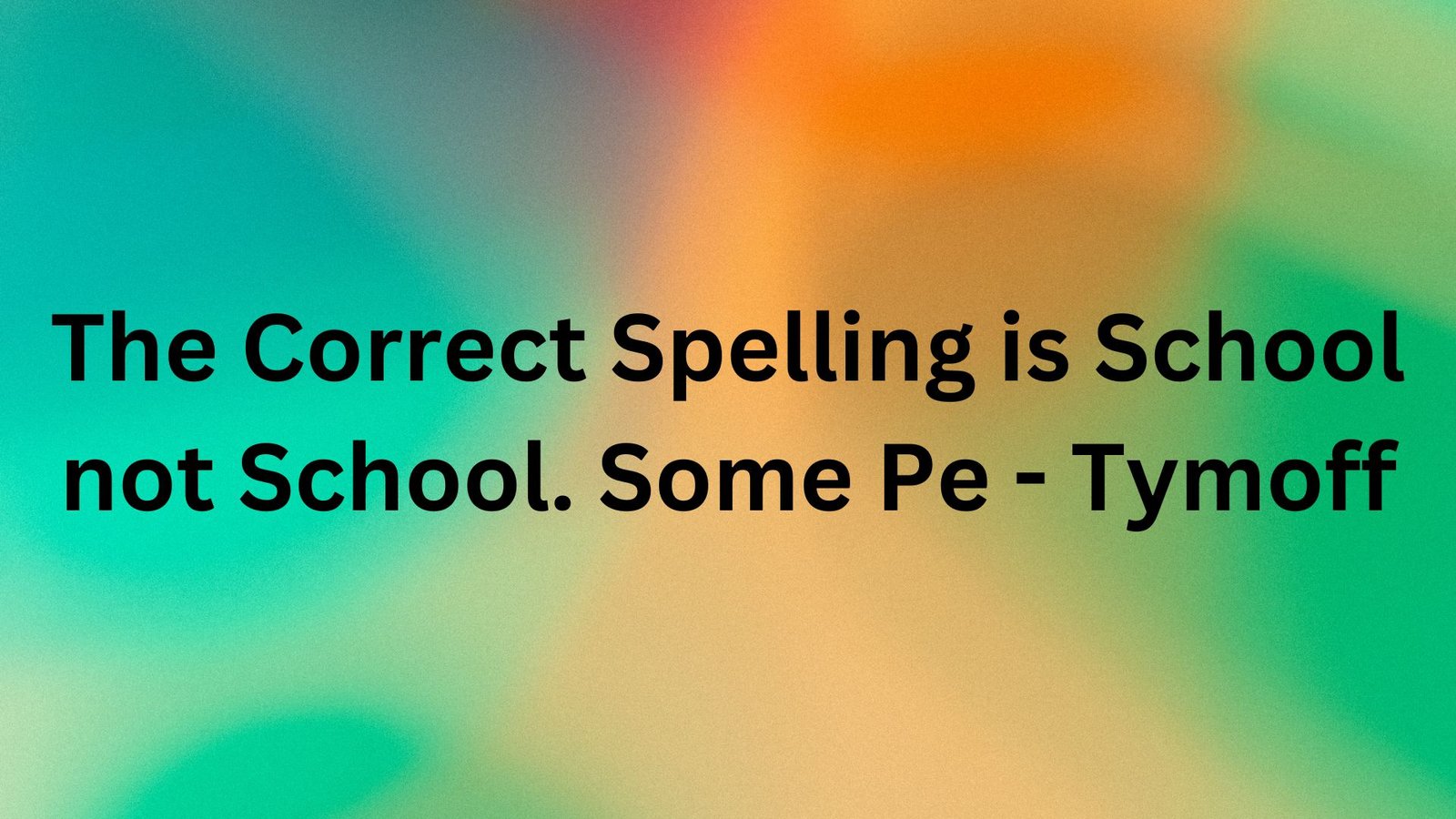
The Correct Spelling is School not School. Some Pe – Tymoff
Are you one of those people who always gets tripped up by The Correct Spelling is School not School. Some Pe – Tymoff“? You’re not alone! In this blog post, we’re going to dive into the correct spelling of this commonly misspelled word and why it’s so important to get it right. Join us as we uncover the truth behind “school” vs. “shcool” and learn how to finally put an end to this pesky mistake once and for all. Let’s spell it out together – school, not shcool!
Introduction to The Correct Spelling is School not School. Some Pe – Tymoff
The English language is known for its numerous spelling rules and inconsistencies, leading to frequent debates over the correct spelling of certain words. One such word that has sparked a long-standing spelling debate is “The Correct Spelling is School not School. Some Pe – Tymoff.” While most people would agree that this word should be spelled with a “h,” some argue that it should be spelled as “scool.” This seemingly minor difference in spelling has caused confusion and controversy, with both sides presenting valid arguments.
The origins of this debate can be traced back to the Middle Ages when English was still developing as a language. During this time, there were no standardized spellings, so words were often spelled phonetically. As a result, variations in spelling emerged, including the use of either “ch” or “k” sound for words like school. However, when modern standardized spellings were introduced in the 18th century, the word was officially recognized as “school” with a silent letter ‘h.’
Despite this standardization, some individuals have continued to advocate for the alternative spelling of “scool,” arguing that it reflects how the word is pronounced. They believe that using a ‘c’ instead of an ‘h’ makes more sense since both letters produce similar sounds – /sk/ – making it redundant to include both letters in the spelling.
On the other hand, supporters of traditional spelling argue that maintaining consistency in written language is crucial for effective communication. They assert that altering spellings based on pronunciation would not only lead to confusion but also undermine proper grammar and literacy standards. They also point out that changing established spellings would require significant effort and resources without any real benefit.
Additionally, some linguists suggest that using unconventional spellings may hinder individuals from understanding different accents and dialects within their own language. For instance, someone who spells school as scool may struggle to read or understand texts written by others who use the traditional spelling. This argument highlights the importance of maintaining a standard form of writing to promote clear communication and understanding.
The debate over the correct spelling of “school” has been ongoing for centuries, with proponents on both sides presenting compelling arguments. While there may be some merit to using an alternative spelling based on pronunciation, it is not considered acceptable in formal written language. Ultimately, writers and speakers are encouraged to follow standard spellings to avoid confusion and promote effective communication.
Read More: Self-Control is Strength. Calmness is Mastery. You – Tymoff
Explanation of the origins and evolution of the word
The word “school” has a long history and has evolved over time to become the commonly used term for an educational institution. Its origins can be traced back to ancient Greece, where the word scholḗ (Σχολή) was used to describe a place of leisure and learning. This word was derived from the Greek verb skholéo (σχολέω), which means “to spare one’s self.”
In its early usage, the term school referred to a group of students or disciples who gathered for instruction under a teacher. It was also associated with philosophical debates and discussions, highlighting the original meaning of leisure and learning.
Over time, as education became more formalized and structured, the word school took on a new meaning. In Latin, it became known as schola, which gave rise to words like scholar and scholarship. The concept of schooling started to revolve around teaching specific subjects in a structured manner.
During the Middle Ages, schools were mainly associated with religious institutions such as monasteries and churches. Education during this period focused on theology and religious studies. However, with the advent of humanism during the Renaissance era, there was an increased emphasis on classical literature and languages in schools.
As European colonizers spread throughout the world in search of new territories, they also brought their language and culture along with them. This led to the adoption of English as a global language and further evolution of words like school.
With industrialization came significant changes in education systems worldwide. Schools were no longer reserved for just the elite but were made accessible to all social classes through public education systems. As literacy rates increased, so did demand for standardized spelling rules leading to debates about how certain words should be spelled.
The word school itself underwent several spelling variations before finally settling on its current form – school – around 1755 by Samuel Johnson’s Dictionary of Modern English Usage.
Today, schools are no longer limited to traditional brick and mortar institutions. The rise of technology has given birth to online schools, virtual classrooms, and other innovative forms of education. Yet, the word school continues to represent a place of learning and growth for individuals of all ages.
The word “school” has a rich history that has evolved over time to reflect changes in education systems and society as a whole. Its origins can be traced back to ancient Greece, but its meaning continues to adapt with the ever-changing world we live in today.
Read More: How I Sleep At Night Knowing I’m Failing All My Cl – Tymoff
Common misconceptions and mistakes in spelling
Common misconceptions and mistakes in spelling can make a significant impact on how we communicate and convey our ideas. In today’s digital age, where we rely heavily on text-based communication, it is crucial to have a good grasp of spelling rules and avoid common errors. However, despite being an essential aspect of language, spelling is often overlooked or taken for granted.
One common misconception in spelling is that all words are spelled exactly as they sound. While this may be true for some words, it is not always the case. English has many irregular spellings that do not follow phonetic patterns. For example, the word “knight” has a silent “k,” and “ghost” has a silent “h.” These exceptions can be confusing for non-native speakers or those learning English as a second language.
Another misconception is that adding suffixes to words will always result in adding -ed or -ing at the end. While this may be true for regular verbs like walk/walked/walking, there are numerous irregular verbs such as eat/ate/eating that do not follow this rule. Similarly, adding prefixes like un- or re- does not always result in simply attaching them to the beginning of the word. For instance, “do” becomes “undo,” but “moral” becomes “immoral.”
Additionally, there are several commonly misspelled words that can cause embarrassment or misinterpretation when used incorrectly. One example is using “there,” “their,” and “they’re” interchangeably when they have different meanings (indicating place/possession/contraction of they are). Similarly, mixing up homophones (words with different spellings but similar pronunciation) such as its/it’s or your/you’re can also lead to confusion.
Some common mistakes in spelling arise from incorrect usage of vowels and consonants. For instance, confusing between i before e (as in receive) and e before i (as in friend) can result in misspellings. Similarly, mixing up words with similar spellings such as “affect” and “effect” or “stationary” and “stationery” can also lead to errors.
Relying solely on autocorrect tools or spell-checkers can also contribute to spelling mistakes. While these tools are useful for catching typos, they do not always recognize context-specific errors or grammatical inconsistencies.
Having a strong understanding of spelling rules is crucial for effective communication. By being aware of common misconceptions and mistakes in spelling, we can improve our overall writing skills and avoid making embarrassing errors. It is essential to continuously practice and pay attention to detail when it comes to spelling to ensure clarity and accuracy in our written communication.
Read More: I Fear No One, But Respect Everyone. – Tymoff
The impact of social media and technology on spelling habits
The rise of social media and technology has greatly influenced the way we communicate and interact with others. With the increasing use of text messaging, social media platforms, and autocorrect features, our spelling habits have been significantly impacted. While these advancements have made communication more convenient and efficient, they have also had a negative impact on our spelling skills.
One of the main ways social media and technology have affected our spelling is through the use of abbreviations and acronyms. In order to fit within character limits or save time while typing, many people resort to shortening words or phrases. For example, “because” becomes “b/c,” “laugh out loud” becomes “lol,” and “talk to you later” becomes “ttyl.” While these may seem harmless in a casual conversation with friends, they can quickly become ingrained in our writing habits. This leads to common misspellings such as using “u” instead of “you” or “r” instead of “are.”
Moreover, autocorrect features on smartphones and computers have made us reliant on technology for correcting our mistakes. While this can be helpful at times, it also means that we are not actively thinking about proper spelling when composing a message or post. We rely on technology to do the work for us without realizing that it may not always catch every mistake or offer the correct suggestion.
In addition, social media platforms often prioritize speed over accuracy in communication. With feeds constantly updating and notifications buzzing non-stop, there is pressure to respond quickly without taking the time to proofread before hitting send. This results in frequent typos and misspellings being overlooked.
Another significant factor influencing our spelling habits is the lack of emphasis on traditional grammar rules in today’s educational system. With spell checkers readily available for students’ use during assignments, there is less focus placed on learning correct spelling independently.
However, despite these negative impacts on our spelling habits, there are also some positive aspects of social media and technology. Online tools such as Grammarly and spell checkers can help identify errors and improve our spelling skills. Additionally, social media platforms have the potential to expose us to different writing styles, languages, and cultures.
The impact of social media and technology on our spelling habits cannot be ignored. While it has made communication more convenient, it has also led to a decline in proper spelling skills. It is important to recognize these influences and actively work towards improving our spelling abilities for effective communication in both personal and professional settings.
Read More: Love What You have, Before Life Teaches You to Lov – Tymoff
Why it’s important to use the correct spelling
Spelling is an essential aspect of language that allows us to communicate effectively and accurately. It is the process of arranging letters in a specific order to form words, and it plays a significant role in ensuring clear and understandable communication. However, with the rise of technology and social media, many people have become lax when it comes to spelling correctly. The internet has made it convenient for us to rely on autocorrect or spell-check tools, but these are not always reliable. As a result, there has been a decline in proper spelling among individuals, especially in informal settings like text messages or social media posts.
So why is it important to use the correct spelling? Firstly, correct spelling helps convey the intended meaning without any confusion or misinterpretation. When we misspell words or use incorrect spellings, it can completely change the meaning of what we are trying to say. For example, “I went to school” can be easily understood as compared to “I went o skool.” One small mistake can alter the entire message and lead to misunderstandings.
Secondly, using correct spelling reflects positively on an individual’s level of education and attention to detail. In academic or professional settings, poor spelling can negatively impact how others perceive us. It may give off the impression that we lack attention to detail or do not take our work seriously. On the other hand, using proper spelling shows that we have put effort into our writing and value effective communication.
Moreover, having good spelling skills is crucial for success in various fields such as writing papers or reports for school or work. Not only does it make our writing more professional and credible but also improves its readability. Poorly spelled documents may be challenging for readers to understand and may even undermine our credibility.
Additionally, correct spelling aids in developing strong reading skills as well. When we encounter new words with unfamiliar spellings, it forces us to sound them out phonetically which enhances our understanding of the language. It also helps us recognize common spelling patterns and rules, making it easier to spell new words correctly in the future.
Furthermore, using correct spelling is crucial for building confidence and self-esteem. Making frequent spelling errors can be embarrassing and may discourage individuals from writing or expressing themselves effectively. On the other hand, mastering proper spelling can boost one’s confidence in their writing abilities and encourage them to communicate more confidently.
Using correct spelling is vital as it ensures clear communication, reflects positively on our education and attention to detail, aids in success in various fields, contributes to developing strong reading skills, and boosts confidence. So let’s make a conscious effort to use the correct spelling at all times!
Read More: Vestaustralien Billetter OG Adgangskort
Tips for Remembering The Correct Spelling is School not School. Some Pe – Tymoff
Spelling is an essential skill that we use every day, whether it’s writing a text message or typing up an important email. However, with the rise of technology and autocorrect features, our spelling abilities may have taken a back seat. It’s not uncommon to see misspelled words in everyday communication, but for some words, there seems to be a constant struggle to remember their correct spelling.
If you find yourself struggling with certain words like “school” and “peace,” don’t worry; you’re not alone. The English language can be challenging with its many exceptions and silent letters. However, with the right tips and tricks, you can improve your spelling skills and avoid making common mistakes.
Here are some helpful tips for remembering the correct spelling of tricky words:
- Break it down: One effective way to remember how to spell a word is by breaking it down into smaller parts. For example, the word “school” can be broken down into two syllables – “sch-ool.” This technique helps us focus on each syllable separately instead of trying to remember the entire word at once.
- Use mnemonic devices: A mnemonic device is a memory aid that uses patterns or associations to help recall information more easily. For instance, for the word “piece,” you could use the phrase “P lease I Expect Complete Excellence” as a reminder that there is an extra ‘e’ after ‘p.’
- Visualize it: Another useful technique is visualizing the word in your mind while saying it out loud several times. This method can help create a mental image of how the word looks and sound in its correct form.
- Write it out: Writing out difficult words repeatedly can also help commit them to memory better than just reading or saying them aloud. You could also try writing them in different contexts, such as using them in sentences or incorporating them into a story.
- Pay attention to patterns: English spelling may seem random and unpredictable, but there are often underlying patterns that can help you remember how to spell certain words. For example, the words “receive” and “believe” both have the ‘ei’ combination pronounced as ‘ee.’
- Use online resources: With technology at our fingertips, it’s easier than ever to get help with spelling. There are several websites and apps that offer spelling games, quizzes, and tips to improve your skills.
Remembering the correct spelling of tricky words may take some time and practice, but by using these tips consistently, you’ll be well on your way to becoming a better speller. So next time you come across a word like “school,” don’t forget to break it down, use mnemonic devices or visualizations, write it out repeatedly, pay attention to patterns, and utilize online resources for extra support.
Read More: Total Excess Car Insurance Meaning Steadfast Marine
Famous examples of misspelling
Misspelling is a common occurrence in the English language, with even the most proficient speakers and writers making mistakes. From typos to phonetic errors, there are numerous ways in which a word can be misspelled. In this section, we will take a look at some famous examples of misspelling that have gained notoriety over the years.
- “Google” instead of “Googol”
One of the most iconic examples of a misspelling becoming widely accepted is that of Google, one of the largest technology companies in the world. The original spelling was supposed to be “Googol,” which refers to the number 1 followed by 100 zeros. However, when founders Larry Page and Sergey Brin were registering their domain name, they accidentally misspelled it as “Google.” Despite realizing their mistake, they decided to keep the name as it was unique and memorable.
- “Potatoe” instead of “Potato”
Former United States Vice President Dan Quayle made headlines in 1992 when he famously added an extra ‘e’ at the end of potato during a school spelling bee event. This mistake caused much embarrassment for Quayle and has since become one of the most well-known examples of politicians making spelling errors.
- “Wierd” instead of “Weird”
The word weird has consistently been listed among the top ten words people commonly misspell. In fact, even Microsoft Word’s spell check tool suggests adding an ‘i’ after ‘e.’ This mistake might have originated from its pronunciation or similar-looking words like field or shield.
- “Alot” instead of “A lot”
This is another common error that many make without realizing it’s incorrect. A lot should always be written as two separate words and never as one word or with any other variation such as alot or allot.
- “‘Til” instead of “Till”
‘Til is often used as a shortened form of the word until, but it’s actually incorrect and considered a misspelling. The correct spelling is till, which refers to up to a certain point in time or place.
- “Misspeled” instead of “Misspelled”
Ironically, the word misspelled is often misspelled itself, with many people adding an extra ‘e’ after the double ‘s.’ This error can be attributed to its pronunciation, where the emphasis is placed on the second syllable rather than the first.
These famous examples show that even words we use every day can be easily misspelled. It’s essential to pay attention to proper spelling and grammar rules to ensure effective communication. However, it’s also important to remember that mistakes happen, and it’s never too late to learn from them and improve one’s writing skills.
Read More: Love What You have, Before Life Teaches You to Lov – Tymoff
The Debate over Whether or not to Adopt The Correct Spelling is School not School. Some Pe – Tymoff
The topic of spelling reform has been a contentious and ongoing debate for many years. One of the most recent proposals in this discussion is the adoption of a new spelling for words like “school” and “period.” These proposed changes, often referred to as phonetic or simplified spellings, aim to align written words more closely with their pronunciation.
Those in favor of this reform argue that it would make English spelling easier to learn and use. They point to the fact that English has one of the most complex and irregular spelling systems in the world, making it difficult for non-native speakers and young children to master. Proponents also argue that adopting a new spelling system would save time and resources by eliminating the need for constant corrections and revisions.
On the other hand, opponents of this reform believe that changing established spellings would be confusing and unnecessary. They argue that while English may have inconsistencies, these quirks are part of its history and should not be discarded lightly. Furthermore, critics contend that simplifying spellings could lead to homophones (words with different meanings but pronounced the same) which could create confusion in communication.
One example often cited in this debate is the word “period,” which some suggest should be spelled as “p-e-r-i-o-d.” Supporters claim this change reflects how most people pronounce it while detractors worry about potential confusion between “period” meaning punctuation versus “period” meaning menstrual cycle.
Moreover, many language experts believe that altering spellings could have detrimental effects on literacy rates. Traditionalists argue that if we allow flexibility in spelling rules for one word like “school,” where does it end? This could open up Pandora’s box of endless debates about which words should be adapted next.
Another vital argument against adopting a new spelling for “school” is its historical significance. The traditional spelling holds centuries worth of meaning and cultural value; changing it would disregard its rich history.
Read More: Learn to Sit Back and Observe. Not Everything Need – Tymoff



